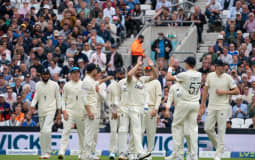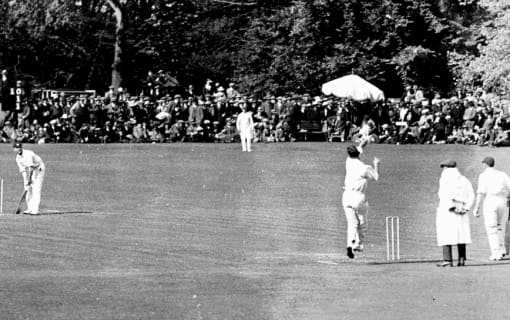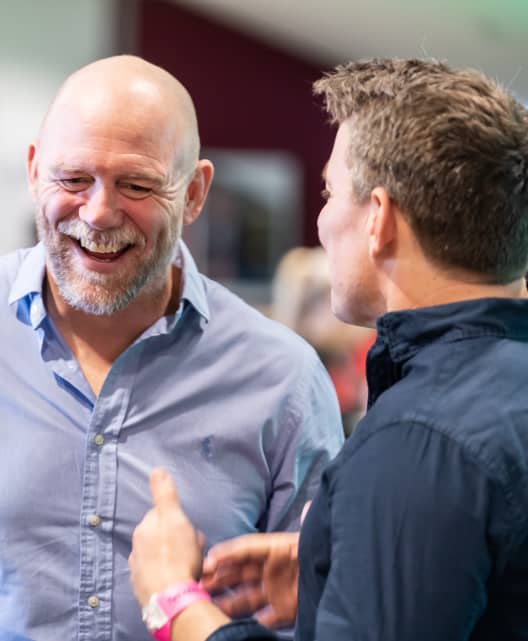(estimated 6 minute reading time)
We sat down with former England fast bowler and Ambassador to The Green Room, cricket legend Darren Gough, and discussed his illustrious career (including his greatest cricket moment) and insights into the sport he loves.
Despite a career dotted with injuries, recoveries and comebacks, Darren Gough is a cricketer who will be remembered and revered for generations. As a leading wicket-taker and decorated with titles including The Ashes Player of the Series and Wisden Cricketer of the Year, Gough has truly made a stamp on the sport, and we were thrilled to sit down and speak to him.
The Green Room – Taking you back to your early days, what was it about cricket that made you think ‘yes – this is what I want to commit myself to’?
Darren Gough – I think most people who know me from my childhood would say, “I played cricket in the cricket season, and football was always my first love” and I was pretty good at football, up to a certain age. Everybody grew and went past me, and I ended up being this small guy, I was a late developer. Then when I did develop at 16, which was quite late, I got that power and I suddenly found that pace.
I always loved cricket, I used to sit there watching it on TV. When I made my debut first class in 1989 against Middlesex at Lords, I’d never actually watched, live, a first-class cricket match, which people can’t believe to this day because most people are brought up in cricket. Their parents take them to first-class cricket matches, or a T20 now, or a 50 over game. I’d never even seen a cricket match live, professionally. I used to sit and watch Test Match Special on the TV and look at Beefy and those sorts of players, like Richard Hadlee from New Zealand, Malcolm Marshall, Viv Richards and I used to think, “Oh, I’d love to be doing that one day.” But football was always my dream, I ended up just being a pretty good cricketer, really.
TGR – Where do you think that passion came from and was there anything particularly that inspired you?
DG – I always believe about anything in sport, when you get to the age of 11, you are influenced by things that go on around you and for me, in 1981, a few things happened. Glenn Hoddle was absolutely brilliant, when Ricky Villa scored that goal for Tottenham Hotspur, so Glenn Hoddle became kind of a sporting hero of mine. Steve Ballesteros was dominating golf alongside Nick Faldo so they played a big part in my upbringing. In cricket, in 1981, is Ian Bothan’s most famous series so those three people, or four people if you want to put it, were hugely influential in my teenage years. So from 11, 1981, that’s when it all happened and I wanted to fulfil those dreams.
TGR – Do you think it’s essential to have that love and passion for the sport to be a top cricketer?
DG – I think it’s hard for me to answer a question when people ask you about your love and desire, is it important? Because for me, it is. And I think everybody who saw me play and they see me now on a daily basis, or when I talk about sport, I’m very passionate. I love the game, I love all sports, rugby, football, cricket, and golf. I’m obsessed. I’m an absolutely sport-billy, as we used to call me at school. I think there is now where sport is becoming more about the financial benefits of playing sport. I think we have lost a little bit of that personality edge with our sports people around the world. The money’s massive but we do still have people that go and enjoy what they do. However, I think money has taken over a big part of sports in this modern era.
TGR – Having played in an era where Australia dominated the world scene, as an Englishman, did the pressure to perform ever dampen that passion or spirit for the sport?
DG – Pressure of the game is an interesting one, because when you go into the England side for the first time, you’re a free spirit. It is amazing, that feeling. I can still remember it. I was walking out, I was visiting my first One Day International, and you just look around you, the noise, and the excitement. There’s a little bit of fear there but it’s more because you don’t quite know what’s going to happen. It soon changes when you hear that roar, that noise, to play in front of 20,000 people. To go to India and play in front of 100,000, which I did and in Melbourne, Test Match, 95,000, it kind of lifts you. The longer you play, the more pressure that comes because you’re no longer that guy who comes in to play one game and you’re a free spirit. People now expect, and the pressure from the media, the pressure from social media, the pressure from your employees, is to perform and it does get harder. That’s why we always say to our young pros, “The first year can be a bit of a breeze and that’s where you have to really step up and train harder” because that second year, you get found out. People have seen you, people know what you’re about, know your strengths, know your weaknesses, and they can really work you out, and you have to work harder. If you stop working, you will fall behind.
TGR – For all those people who will never experience what it’s like, can you describe the feeling of coming through the Long Room at Lord’s, out onto the field for a Test Match?
DG – The way I can explain it, my debut was at Lords and I’ll be honest with you, I didn’t even know where I was going, I’d never been to Lords. When they said go down the stairs and walk out of the long room, I think I went down too far, and I ended up coming around the side. I didn’t even go through the main gates when I first played there, to get out onto the pitch. When you walk through the long room, it’s special.
When you’re at the Oval and you walk down the steps, it’s quite a long walk down the steps and the crowd are all clapping, they want your autographs when you’re coming back up.
At Headingley, you walk out as the home player, and there are 20,000 just cheering your name. I played a game at Headingley against West Indies, I went out there and got a nought in the first innings, and I got cheered off. I mean, what better way? You go out there with all the expectations but it just goes to show the love for the home player. I went out there, I wanted to get runs, I wanted to do well, I got a duck, and I came off really disappointed, obviously, and quite depressed. I kept my helmet on because I didn’t want anybody to see the embarrassment and then you’ve got 20,000 people cheering you.
TGR – Since retiring have you missed that feeling and do you still get your pads on occasionally?
DG – Well, I’m 53 years old now and you know, the thing is, they’ve brought you these Legends leagues and I’ve always been asked to play in a couple of these Legends tournaments and I think they’ve got the idea now, but I’m not going to play again.
But I’ll tell you what, I had a jab the other day in the shoulder, and it’s feeling fresh again. If the rest of the body can get in some kind of shape, we might just get there. I might struggle with a metal leg, which is part of bowling fast, which is obviously an operation I had since I retired. But of course, every time I watch these tournaments around the world, the major tournaments, the World Cups, I see a test match, and I get to see a few now working at Headingley. Then obviously, the Oval test matches with The Green Room, it’s unbelievable. Every time you get there and you see the build-up, you want to be part of it. I speak to my mate, Harmy, who’s with us in The Green Room, and we both look at each other and say, “It’d be nice to have a bowl today”, but that’s age. Unfortunately, it comes to us all.










